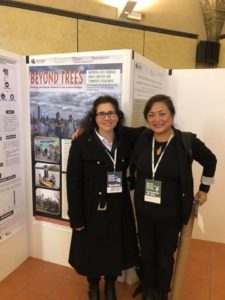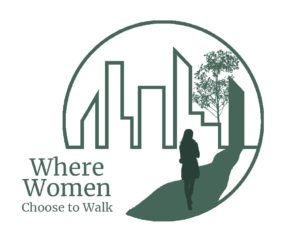“Boy, I’m sure glad I’m not your husband.”
I remember my mind racing over the last few minutes of the discussion at an event I was leading, and thinking about what, if anything, I had said or done, to warrant such an inappropriate comment. Quite simply, I was shocked. So, I said nothing, I ignored it and kept right on speaking.
Moments define us; like that moment ten years ago. That statement has still stuck with me all these years later.
I have been lucky to have had strong female role models in my life: my sister, my mother, my grandmother, my aunt, friends, and several teachers and mentors. I didn’t think too much about their influence on me, nor did I pursue my work or life through a gendered lens until I was older. Growing up as a second-generation Canadian of Armenian descent, and as a daughter, I certainly had a conservative upbringing.
My introduction to urban forestry began when I embarked on my Masters of Forest Conservation at the University of Toronto where I learned about policies, techniques and technologies. Later deepened though my doctoral research at York University, I began to understand the depth and breadth of marginalization in the industry and across affiliate disciplines. Using a political ecology lens, my research focused on arborist perspectives and identity constructions (Bardekjian, 2015); and this is where my interest in gender equity and women’s work peaked.
My postdoctoral research through UBC then examined women’s participation and experiences in North America to understand the barriers they face and the strategies they use to overcome them (Bardekjian et al, 2019). Key survey results from over 500 women across Canada and the US, revealed that 68% of respondents felt that the barriers they experience are because they are women, and that the top three barriers in women’s work environments are: discrimination, sexism and harassment, not being taken seriously, and not feeling that education had been sufficient for the roles they are performing. This has significant implications for professional development, mental health, employee retention, and recruitment. Results also revealed suggested strategies for leadership opportunities, which included mentorship; confidence building; communications skills and better ways to convey what women want; and better options for having a work-life-family balance.
Throughout 2018, I had the privilege of sharing these research results at several conferences and engaging in multiple discussions with other women in urban forestry, arboriculture, and natural resource management.
Women face many barriers – and they want to talk about it! We have a wealth of anecdotal evidence locally and globally but with little numbers to support it. There is a collective need to share stories and create spaces for voices to be heard. In urban forestry and arboriculture, and beyond, we are seeing many opportunities for women to connect with one another and share stories and experiences; to ask for advice; and to build a community of trust and leadership – both locally and internationally.
There are currently many initiatives underway to address gender inequity in urban forestry and forestry in Canada, and beyond, some include:
• Policy and action planning: Gender Equity in the Forest Sector; Fem4 Forests
• Conferences/congresses: Forests in Women’s Hands; Women’s Forest Congress; Women in Trees and Women in Natural Resource Sciences
• Events and activities: Women in Arboriculture
• Networks: Women in Trees; Women in Wood
• Industry training workshops (e.g. Her City Toolbox – UN)
For me, the cross-cultural exchanges weave a broader narrative about global collaboration, understanding and empowerment.

To contribute to this milieu, my dear friend, fellow author and colleague, Liza Paqueo of the US Forest Service, and I, have started a monthly discussion series called, “Where Women Choose to Walk: Paths to improving cities and nature.”, with its launch at the recent Nature of Cities festival. Our goal is to bring women together who work in urban natural resources, to share stories and strategies, to learn and support one another towards an inclusive global community of practice. Over the next year, each month we will explore and tackle a variety of topics with international panelists, such as women in research, community values, motherhood and parenting, women led organizations, stewardship and survival, livelihoods and resiliency. Sessions will be recorded and shared on YouTube.
On March 8th, in celebration of International Women’s Day, our discussion will focus on motherhood in all its glory and struggles; topics include work-life-family balance; careers and workplace policies; identity shifts and cultural contentions; raising environmentally-inspired children; and alternative livelihoods during the pandemic. This session is open to ALL – mothers, non-mothers, men, all genders, and all ages. Register now for this event.
Join us for our upcoming episodes and then continue the conversation online through the following Facebook groups:
- Women in Urban Natural Resource Management, Beyond Trees Network
- Moms Working in Environmental and Natural Resource Management

Adrina C. Bardekjian, MFC, PhD
Manager, Urban Forestry Programs and Research Development, Tree Canada
Adjunct Professor with Forestry, Institute of Forestry & Conservation, Daniels Faculty, University of Toronto
References:
Bardekjian, A., Nesbitt, L., Konijnendijk, C., & Lötter, B. (2019). Women in urban forestry and arboriculture: Experiences, barriers and strategies for leadership. Urban Forestry and Urban Greening, (46).
Bardekjian, A. (2019). Women in Urban Forestry, Arboriculture and Natural Resources: Reflections on three panel discussions. Adrina Bardekjian blog.
Bardekjian, A. & Paqueo, L. (2019). Beyond Trees: Growing international stewards in non-traditional ways. In Campbell, L., Svendsen, E., Sonti, N., Hines, S., & Maddox, D. (Eds.), Green Readiness, Response, and Recovery: A Collaborative Synthesis. Gen. Tech. Rep. NRS-18x. Newtown Square, PA: U.S. Department of Agriculture, Forest Service: 292-305. https://doi.org/10.2737/NRS-GTR-P-185-paper20.
Bardekjian, A. (Writer, Director). (2018) Women Branching Out: A diversity of careers in arboriculture and urban forestry [FILM].
Bardekjian, A. (2017). Women In Trees: Sharing Experiences and Lessons. City Trees: Journal of the Society of Municipal Arborists (July/August 2017, pg. 10-13).
Bardekjian, A. (2015). Learning From Limbwalkers: Arborists’ Stories in Southern Ontario’s Urban Forests. (Accession No. 10315/30088) [Doctoral dissertation, Faculty of Environmental Studies, York University, Toronto, Ontario]. YorkSpace. Available at: http://hdl.handle.net/10315/30088
Back to all articles